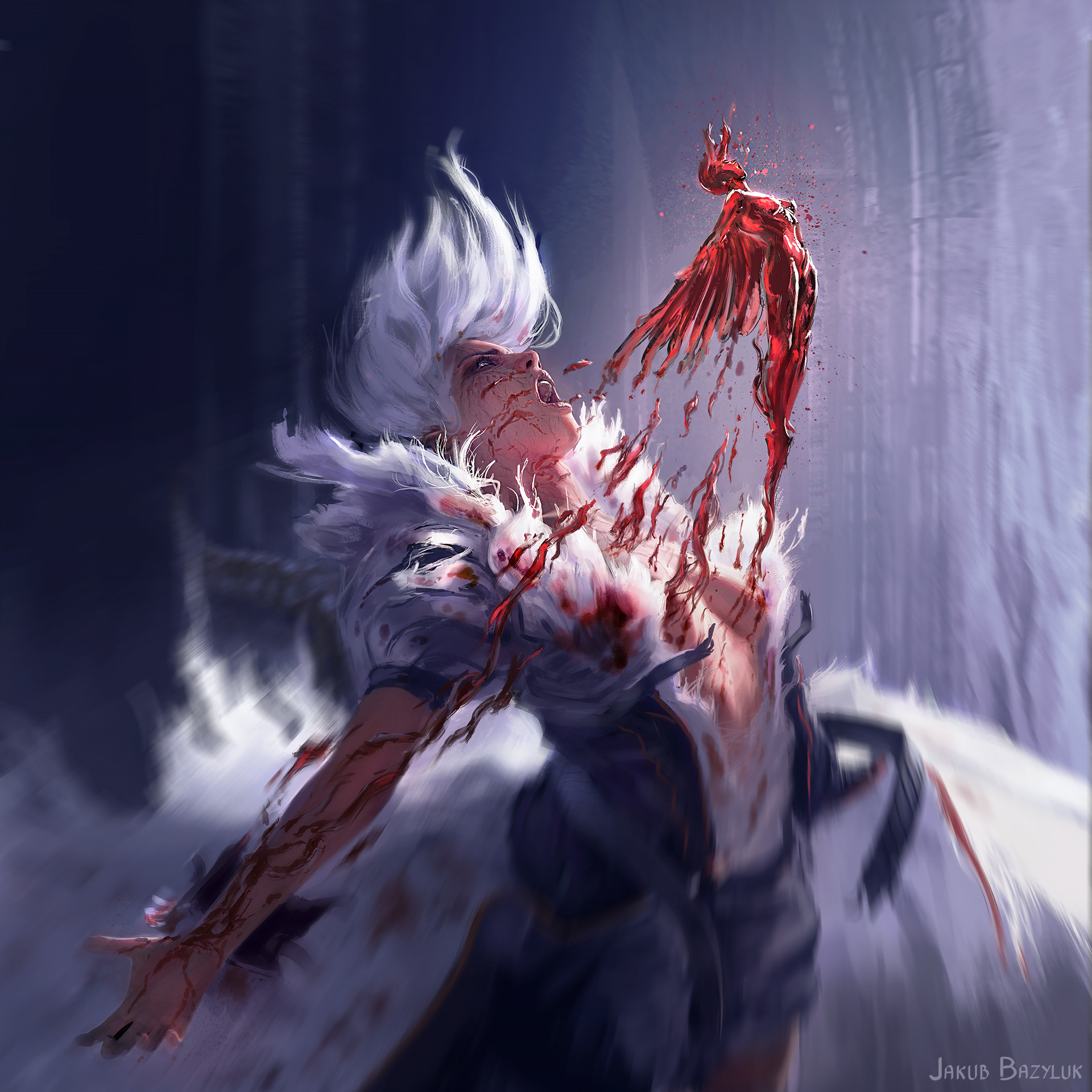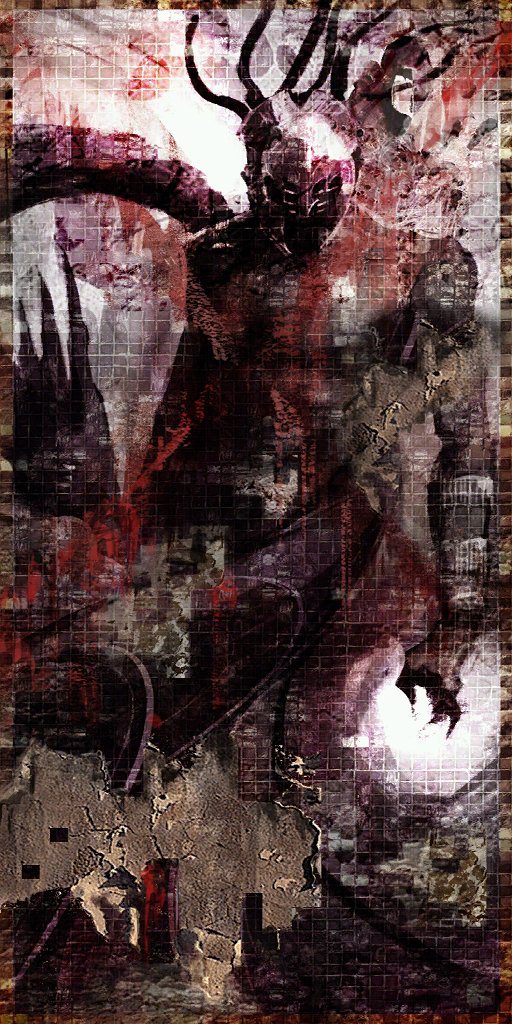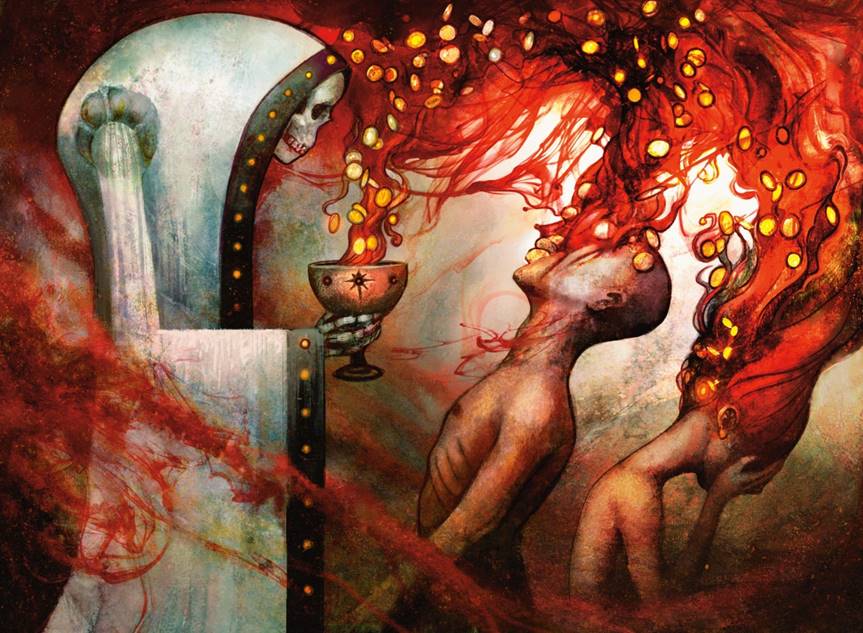 |
| By Seb McKinnon. |
The Force of Magic
What laymen call magic - that is, the casting of spells, the working of rituals, and other such supernatural powers - is a deeply personal thing. Not just on the mental level, but on the physical as well. To cast a spell is to turn one's body into a channel for something utterly paranormal; to let something leave you and rearrange the world before you. This is an idea that many have discussed in a philosophy called the River & the Rain.
The River is the actual force flowing through the spellcaster. It is that eldritch momentum that ignites a fireball in a perfect vacuum or that polymorphs a griffon's body into a comatose mouse.
The Rain is the greater force that the spellcaster is calling on. It is a metaphysical concept, an energy that permeates everything, the stuff that keeps the universe expanding, the noosphere too, and that ideas generate when conjured forth.
Together, the River & the Rain make up the force of magic. The more of the rain you can call upon to flow into your river, the more force the river has, or in other words, the spell you are casting becomes all the more powerful. This is a tangible thing. It can and has been measured by cabals of arcane workers, by congregations of divine priests, by circles of druids hidden in the hill and mist. This is, mechanically, what a spell level is. Call it a Spell of the 1st Circle if you want, or a Miracle of the 1st Order, or whatever name you can conjure forth. It all means the same thing: spell level.
And if a spell's level is tangible to the amount of force that the spell produces, and if this force is a river flowing through the spellcaster, then it is only natural that there are many limitations to spells - as many as their are limitations of the physical form.
For example, a human's max recorded jump height is 63.5 inches - a little over 5 ft or 161 cm. It stands to reason that, with little variation, a human cannot possibly jump higher than that; their biology will not allow it. So then is it true that a human can only cast spells so strong due to their own biological limit. It is a limit that can be raised with training, yes, but it is a limit nonetheless. And just as a human cannot jump their max height an infinite number of times, neither can the spellcaster cast their spells an infinite number either. Thus, spell slots.
Let's first translate this to some more interesting narrative concepts, and then see what it leads too mechanically.
 |
| By Jakub Bazyluk. A spellcaster violently letting the River flow for a spell. |
Magical Exhaustion
As the River flows so too does the spellcaster's body suffer wear and tear. Their neurons, during the casting of a spell, are firing on every possible cylinder. The complex network of bacteria, fungi, and cells that makes up a living being are all, for that moment, uniting their potential to one specific purpose. Such effort does not go unpunished. Eventually, a spell caster will expend all of their spell slots and be left with just their own, natural, mortal selves.
What does this look like? It is different, yet always the same. A feeling that one's heart is beating slower - that their blood is thinner than it was before - that their stomach cannot digest food or liquid. Thinking is done through a haze as memories are rebuilt and personality traits reestablished by the previously overloaded mind. It will feel like your nails are loose in their cuticles; like your bones are only barely attached to their joints.
In other words, it is not a pleasant feeling. Not like being exhausted, but similar, thus its simple term of being magically exhausted. No spellcaster likes it. Many avoid casting their last spell so that they can avoid this state. In games where they only get one or two spells a day at early levels, it is a state frequent. In exchange for being able to blow a door open or warp someone's perception of you, you just feel like abject shit.
Below, a d12 table. Roll on it when you spend your last spell slot. This effect is lost when you regain any spell slots. These effects are in addition to the above description.
- Your eyes are weakened; you see low detail versions of everything around you.
- You lose all sense of temperature except for a spreading, extreme heat inside of you.
- You vomit immediately, and can keep no food or liquid down for long.
- Memories of specific things, such as people's names, your favorite color, or the name of where you are disappear.
- Your personality is eroded, leaving you bland, neutral, and unimpressed with things around you.
- Natural instincts like fear, pain, and anger are gone, significantly mellowing your reactions.
- When others look at you, they forget what you look like, sound like, or act like the moment they look away.
- Your name is damaged; others can only remember and refer to you as either the first or last letter of your name.
- Non-magical things that you touch sometimes slip through your fingers as if they were never there.
- Your thoughts leak out of your head and into others around you.
- A magical, aurora-glowing sweat drips off of you and rises as steam too. Whatever it touches - clothing, grass, other's skin - it steals away its color.
- You continuously cry, though these tears you shed are more akin to blood than anything else.
A night's rest, a week's rest, whatever your rest is allows your body to heal, and thus the magical exhaustion ends.
Exhaustion serves as a way to note that you are growing stronger. Magical exhaustion is no different. Eventually, your ability to let flow greater rivers for longer duration will mean that magical exhaustion is harder and harder to come by. And just as muscles grow visibly larger, a spellcaster grows a greater presence the more powerful they become.
 |
| By Seb McKinnon. Magical Exhaustion is similar to feeling as if you are fading away, mist in the sun. |
Eldritch Presence
Eldritch Presence is the concept coined that shows how powerful a spellcaster is. It is an aura about them - a non-visible force that is felt in the minds of those close. The higher the spell level that the caster can cast, the more powerful their Eldritch Presence is.
It feels like looking at a sky where stormclouds are just creeping on the horizon. Like looking around and seeing a gentle wind pick at the trees and grass as the grey above grows ever darker. A gravity that does not pull you inwards,and a force that does not push you away but that threatens almost innocently. It sets your hairs on fire, waves of goosebumps racing from shoulder to hand. Cats will bristle if this force is malignant. Your hair will stick to your head, as if you are sweating. Glass fogs, blades become sharper, colors more vivid. Most noticeably of all, your thoughts will race. Faster and faster will you think as if something was empowering your mind in ways never before felt. Like an adderall drop, a hit of speed.
These effects are slight for neophytes. Even for those well-versed, able to cast magics entering into the third, fourth, fifth levels can they be written off by the ignorants who know not what Eldritch Presence is. But beyond that, it is tangible. It is a pressure. It makes the commons bow to the wizard, the king sit more rightly in their throne, the guards ever more guarded.
Hard it is to put a range on such an effect. The range is your sight. If you can see a powerful spellcaster, you can feel their Eldritch Presence. If they are close enough to you that you can hear their voice then you are close enough to feel their strength.
This is why dragons, demons, angels, and all other manner of superior creatures can confidently stare down a battalion of soldiers and not be harmed. So great is their Eldritch Presence that it halves the force of sword swings, makes arrows miss wide. Force field of Rain. Armor of Power.
And if this is how it feels to hold magic, and if magic protects you from certain death, then so too can magic be seen similar at hit points - abstraction of life as it is.
 |
| Guild Wars concept art. Strong Eldritch Presence can even make others perceive you as something beyond mortal. |
Spell Slots as HP
Spellcasting characters no longer have hit points. They instead have spell slots. If they are a half-caster (ranger, paladin) they are uniquely equipped, as now they have their starting hit points and their spell slots to protect them.
When a creature/character (hereafter referred too just as a creature) would suffer damage while having at least 1 unspent spell slot, they instead take no damage unless the damage die rolls either its max number or is above 6 + the amount of spell slots unspent, whichever is higher.
Example: if a 1d8 longsword attack is made against a wizard with 1 spell slot, the longsword needs a 7 (6 + 1) or 8 (max number) to hit. If the wizard has 2 spell slots, only an 8 will hit. If a 3, only a 9, thus requiring a modifier of some sort to deal damage.
If the damage meets one of these two criteria, the spell slot is lost.
If a creature is Magically Exhausted (no spell slots), any damage die rolled against it knocks the spellcaster out and either kills them or leaves them dying, depending on your exact ruleset. If they have hit points, then those instead are effected until the same situation occurs.
This makes magic-users more difficult to kill if they are completely fresh, but essentially makes them nothing better than dead meat if they are out of spell slots. Resource management is all the more difficult now, as you are spending hit points. It will become important for a spellcaster to find a way to regain spell slots more quickly, if not at least temporarily, in order to stave off death for just a while longer. But it also empowers spellcasters when fresh to take on big risks. They can match the great warrior in a duel so long as they allow the River to flow free and to flow hard.
 |
| By Seb McKinnon. Even a little girl, enriched with magic, is mighty as the armored soldier. |
Temporary Spell Slots
The following methods can be used to regain temporary spell slots; that is, spell slots that disappear when your normal spell slots are regained. You cannot have more temporary spell slots then you have maximum spell slots.
Places of Power, such as shrines, altars, magical lairs, old arcane battlefields, moonless nights with the right constellations, etc etc, can be meditated in for 10 minutes, regaining 1d4 spell slots.
Rituals & Sacrifices if you are a divine/miracle caster can be done in the name of your Power/Divinity, allowing you to regain 1 temporary spell slot per miracle you know.
Eldritch Cannibalism can be done on a creature with Eldritch Presence. Drinking a dragon's blood or eating a captured pixie will give you 1 temporary spell slot per HD the creature has.
Contracts & Pacts & Deals can be made with a creature with Eldritch Presence. In exchange for a favor, they lose 1 spell slot and you gain 1 temporary spell slot. They cannot regain their spell slot until you lose your temporary one. Temporary spell slots gained this way are added on top of your maximum spell slots and do not disappear when you regain spell slots, instead only disappearing when the favor is completed or you die.
Various esoteries, like blue goldstones, opals with polished fire, or the tears of a heartbroken siren can be used similar to health potions, granting 1 temporary spell slot.
 |
| By Seb McKinnon. The River can flow from one to another in pacts and rituals. |
Cantrips & Other Outliers
In some games and traditions, spellcasters have access to cantrips - low level magicks that require little effort to use. If you can cast cantrips, you are using your Eldritch Presence to shape reality in a minor way around you. Even when Magically Exhausted does a spellcaster have at least a little presence, and thus can cast cantrips. Cantrips have no bearing on a spellcaster's hit point abstractions.
In some games and traditions, spellcasters eventually can learn to cast a low level spell as if it were a cantrip. This is a feat of great power. If you can only cast a single spell like this, treat it as if it were a cantrip. But, if you are, say, a demon with multiple at will spells, your Eldritch Presence is never truly diminished. The only thing that can kill you is a magical weapon of some sort or a spell being used to destroy you when your limited spell slots are spent. Mortal forces cannot.
 |
| By Seb McKinnon. No steel nor arrow will kill that with Presence Eldritch as This. |